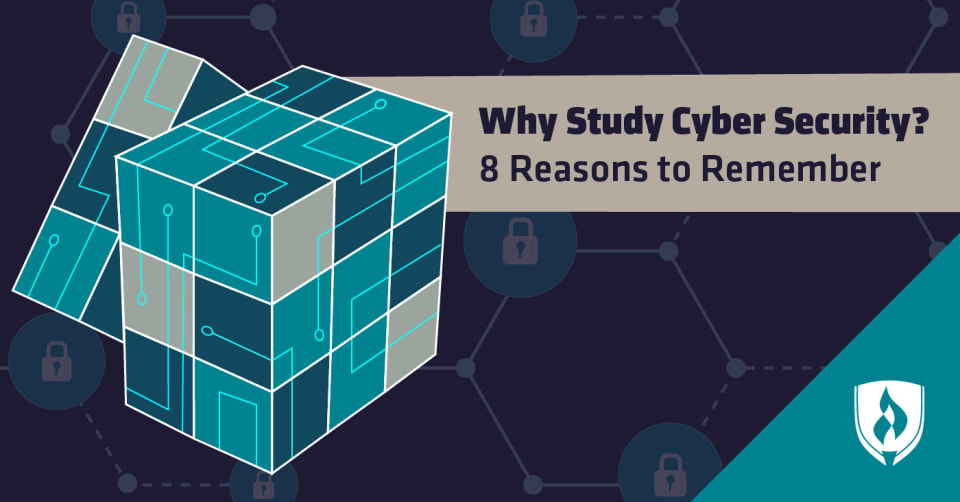It really does seem like cyber security is impossible to ignore these days. And cyber security experts insist that it will be more and more dangerous for companies to ignore growing digital threats. If you’ve looked into cyber security before, you know how critical this role is becoming in today’s society.

But critical doesn’t necessarily mean it’s a good career choice. You want to get a wide-angle view of working in cyber security to see whether an investment in pursuing this career path appeals to you.
You’ve come to the right place—we asked professionals in the cyber security field to weigh in on why they chose this career and what it could offer to career hopefuls in the future. If you're interested in pursuing a career in cyber security, don't forget to check out our article on "Cyber Security Certifications" to learn about the certifications that can help you get started in this field. Maybe you're thinking "what is cyber security?" Read more here.
So, why study cyber security?
“I’ve been in cybersecurity since, well, the beginning of cybersecurity,” says George Kamis, CTO of Forcepoint. “And what I really like about this field is that it’s continuously changing. It seems like every day there’s another news headline about a cyberattack.”
While some like Kamis may love the challenge of securing networks from continually shifting threats and attack approaches, that’s not all there is to like. Read on to learn what else Kamis and others had to share.
1. Our network connectivity is only growing
The learning curve for organizations adapting to the digital world is steep even now. And it doesn’t show any sign of tapering off. “The world is only becoming more networked,” says Allan Buxton, director of forensics at Secure Forensics.
Buxton explains that even cyber security professionals are constantly learning to keep up with the speed of attacks and change. For instance, Buxton points to the computing systems in newer vehicles needing cyber security review—something that would barely register as an area of concern 20 years ago.
“New fields of discipline will emerge—it’s not a field where you can get your degree, go to work, and never have to take a class again,” Buxton says.
More and more household objects are becoming part of the Internet of Things (IoT) and with each comes new challenges to counter and best practices to absorb—and with that can come opportunities.
“There will always be attackers looking to take advantage of insecure implementations, so there’s a job out there for you if you commit to the profession.”
2. Job opportunities are projected to grow substantially
Speaking of opportunities, these careers are on the rise with the Bureau of Labor Statistics projecting a 28 percent growth in employment of information security analysts through 2026—a rate much faster than the national average.1 One of the primary drivers of this growth is the increasing prevalence of cyberattacks.
Great demand doesn’t always equal opportunity where you are, however. IT and cyber governance expert Elvis Moreland points out that even though the job market in general is good for this field, every metropolitan area will be a little different. Sites like Cyber Seek can give you more information on what the cybersecurity needs are in the areas you are considering.
3. Specialties within cyber security are increasing
For a long while, IT departments basically had cyber security duties looped into their work. While it remains closely tied with IT, cyber security is now an established field all to itself—and a variety of roles and needs are developing all the time.
“I enjoy the emerging professionalism of the field,” Moreland says. “Similar to industries like healthcare, we have specialties in governance, engineering, assessment, risk management, compliance, architecture, operations, eDiscovery, forensics, etc. …”
These specialties just create more options for professionals in the field to truly spend time working on what they like best and developing a deep skill set in specific areas.
4. This job can be hard to outsource
When it comes to securing assets and warding off breaches that could bring down a company—few organizations are willing to roll the dice with outsourcing. While obviously there’s no guarantee this will remain true forever, Buxton says the work of information security professionals, particularly when well-established in larger organizations, is relatively tricky to outsource.
This makes many in-house cyber security professionals well-positioned for job security. This should also give information security professionals working for managed service providers (specialized cybersecurity businesses with multiple clients) some peace of mind as well—it’s relatively “sticky” work and clients aren’t likely to hop from provider to provider frequently.
5. You get to be a hero sometimes
“I’m in this career because, honestly, I found it more interesting than design or administration,” Buxton says. “It can be rewarding work, especially when you stop someone from suffering harm, or track down an attacker for real-world consequences.”
Working in information technology is in a way similar to working as a referee—most don’t notice you when you’re doing a good job as things are just working the way they should. While cyber security work still largely follows this mold, there are certainly times where the nature of your work can add some excitement (and recognition) for your day-to-day efforts. Even when a job well-done flies under the radar, you know that your work directly impacts people’s security and thwarts criminal endeavors.
6. You have multiple viable educational paths
Since cyber security is still pretty new, the industry isn’t weighed down by expectations of how the education path should look. While a Cyber Security Bachelor’s degree is definitely a strong option, Moreland says there’s still a path into the field for those with associate’s degrees in IT—particularly those that focus on security, networking, systems management or even programming.
“The key to being a successful security professional in and around IT arenas is to build a foundation in IT and the fundamentals of security,” Moreland explains. “That is also why I recommend obtaining the CompTIA Network+®, Security+®, and the (ISC)2 SSCP® certifications as part of a comprehensive package.”
If you combine education, experience and up-to-date cyber security certifications, Moreland says your resume starts getting pretty unbeatable.
7. It’s a career of consistent change
“What I love most is that things consistently change,” Buxton says. “Although the fundamentals last—the nuances and details change almost daily.” Buxton says exploits are patched, zero days are discovered, and insiders find new ways to steal data on a regular basis.
“In my field, OEMs and software publishers find new ways to prevent acquisition or review of user data, even though they track and retain more user activity now than ever before,” Buxton explains. “It's a challenge that can only be met with a commitment to learning.”
This environment also favors people who know how to keep learning. Adam Bobrow, founder and CEO of Foresight Resilience Strategies, plans to recruit junior staff into cybersecurity analyst positions that mostly require critical thinking skills and communication over technical skills.
“At the same time, we will help junior employees to build their technical expertise and accumulate certifications,” Bobrow says. “The goal is to prepare them for opportunities in cybersecurity without requiring them to start with technical skills that could be difficult to acquire in the classroom.”
8. You get to solve complex technical puzzles
“I like figuring out how to break things and stop things from breaking, which I think was actually a perfect segue into cybersecurity,” Kamis says. He explains that cyber security is like a puzzle where you have to consider how you could break into a system and how you could stop a system from being broken into all at once.
“From the beginning I realized that I enjoyed solving that puzzle from both sides,” Kamis says.
If you’re the type to love getting to the bottom of logical and technical challenges to find satisfactory solutions, Kamis says cyber security can be an appealing career option.
Cyber security professionals are in demand
“There is no question that every organization will only grow more reliant on data and the systems that store, transmit, and analyze it over the coming decades,” Bobrow says. He adds that the growing adoption of IoT technologies will push the amount of data to be analyzed, manipulated and protected to grow at unprecedented rates.
“Cybersecurity will be a necessary expertise and the need for skilled technicians is likely to only increase making it a good long-term bet for a career.”
Organizations are starting to recognize that cyber security, privacy, and risk management are no longer topics discussed in the server room, Moreland says. “Now they are business assurance mechanisms discussed and monitored in the boardroom.”
If all of these details add up to keep you interested, then working in cyber security might be a perfect career move for you. But what would you actually do, daily, as a cyber security professional? Get some answers with our article “Cyber Security Job Description: What to Expect Working in the Field.”
Related Articles:
- 4 Frighteningly Common Social Engineering Attacks People Keep Falling For
- Hacked Healthcare: Exploring the Growing Importance of Healthcare Cybersecurity
- 6 Impending Cyber Security Threats Holding Our World Hostage
- Computer Programmer vs. Software Developer: Decoding the Differences
- A Parent's Go-To Guide on Internet Safety for Kids
1Bureau of Labor Statistics, U.S. Department of Labor, Occupational Outlook Handbook, [accessed August, 2019] www.bls.gov/ooh/. Information represents national, averaged data for the occupations listed and includes workers at all levels of education and experience. Employment conditions in your area may vary.
CompTIA Network+ and Security+ are registered trademarks of CompTIA Properties, LLC.
Systems Security Certified Professional (SSCP) is a registered trademark of (ISC)2, Inc.




